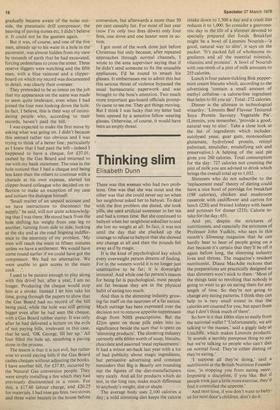Thinking slim
Elisabeth Dunn There was this woman who had two problems. One was that she was stout and the other was that she could never say no when her neighbour asked her to babysit. To deal with the first problem she dieted, she took pills, she used artificial sweetener in her tea and had a rotten time. But she continued to babysit when her neighbour asked her to and she lost no weight at all. In fact, it was not until the day that she plucked up the courage to refuse to babysit that she showed any change at all and then the pounds fell away as if by magic.
It is the kind of psychological key which every overweight person dreams of finding. For in the western world it is no longer just unattractive to be fat; it is downright immoral. And while one fat person's reason for being fat is psychological, most people are fat because they are in the physical habit of eating too much.
And thus is the slimming industry growing fat itself on the neuroses of a fat nation. Much outrage has been expressed over the decision not to remove appetite-suppressant drugs from NHS prescriptions. But the £2m spent on those pills pales into insignificance beside the sum that is spent on 'slimming products'. The slimming industry currently sells £60m worth of soup, biscuits, chocolate and assorted 'meal replacements'. It had a minor set-back last year with a lot of bad publicity about magic ingredients, but persuasive advertising and constant reminders that Big is Beastly are rounding out the figures of the diet-manufacturers very nicely. And all for products which do not, in the long run, make much difference to anybody's weight, size or shape.
The average body uses 2,100 calories a day; a mild slimming diet keeps the calorie intake down to 1,500 a day and a crash diet reduces it to 1,000. So consider a gastrono mic day in the life of a slimmer devoted to specially prepared diet foods. Breakfast might be a bowl of Limmits Nourish—`a good, natural way to slim', it says on the packet. 'It's packed full of wholesome ingredients and all the essential minerals, vitamins and proteins'. A bowl of Nourish with one-tenth of a pint of milk amounts to 255 calories.
Lunch is four palate-tickling Risk peppermint cream biscuits which, according to the advertising 'contain a small amount of methyl cellulose—a calorie-free ingredient that helps to fill you up'. Total: 272 calories. Dinner is the ultimate in technological wizardry: 'Limmits Beef Flavour Textured Soya Protein Savoury Vegetable Pie'.
(Limmits, you remember, 'provide a good, natural way to slim'. Take a close look at the list of ingredients which includes: autolysed yeast, guar gum, monosodium glutamate, hydrolysed protein, retinyl palmitate, emulsifier, emulsifying salt and preservative.) A helping of the said pie gives you 260 calories. Total consumption for the day: 727 calories not counting the pint of milk you are advised to drink which brings the overall total up to 1,032.
Slimmers who do not subscribe to the 'replacement meal' theory of dieting could have a nice bowl of porridge for breakfast (198 calories), chicken and mushroom casserole with cauliflower and carrots for lunch (220) and braised kidneys with beans and potatoes for dinner (233). Calorie intake for the day: 651.
And yet, despite the strictures of nutritionists, and especially the strictures of Professor John Yudkin, who says in this
month's Slimming magazine that he can hardly bear to hear of people going on a
diet because it's certain that they'll be off it again before long, the slimming industry lives and thrives. The magazine's resident nutritionist, Diana MacAdie reckons that the preparations are practically designed so that slimmers won't stick to them : 'Most of the things taste so revolting that nobody is going to want to go on eating them for any length of time. So they're not going to
change any eating patterns. I think they can help to a very small extent in that the calories are counted for you, but apart from that I don't think much of them'.
So how is it that £60m slips so easily from the national wallet ? 'Unfortunately, we are talking to the masses,' said a giggly lady at Unicliffe, which makes Limmits products. 'It sounds a terribly pompous thing to say but we're talking to people who can't diet on normal food. They're either dieting or they're eating.'
'I suppose all they're doing,' said a nutritionist at the British Nutrition Foundation, 'is stopping you from eating more. Imposing a discipline, if you like. But if people took just a little more exercise, they'd find it controlled the appetite.'
And next time, if you don't want to babysit for next door's children, don't do it.


































 Previous page
Previous page